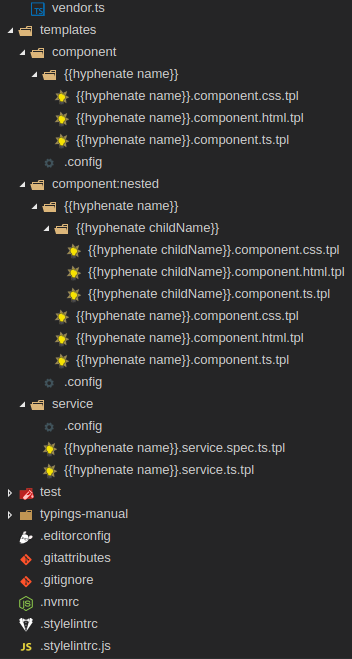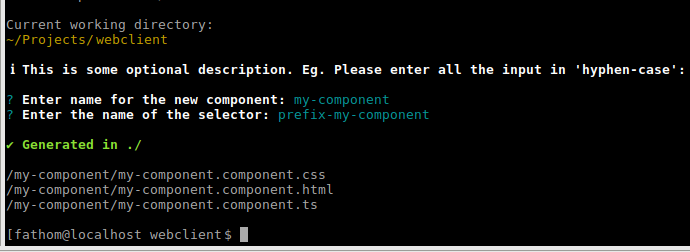https://github.com/efidiles/folder-template
A directory / files generator based on templates
https://github.com/efidiles/folder-template
Last synced: 11 months ago
JSON representation
A directory / files generator based on templates
- Host: GitHub
- URL: https://github.com/efidiles/folder-template
- Owner: efidiles
- License: mit
- Created: 2016-10-23T22:43:22.000Z (over 9 years ago)
- Default Branch: develop
- Last Pushed: 2017-12-05T14:37:31.000Z (about 8 years ago)
- Last Synced: 2025-04-12T23:55:26.531Z (11 months ago)
- Language: JavaScript
- Size: 4.07 MB
- Stars: 13
- Watchers: 4
- Forks: 7
- Open Issues: 4
-
Metadata Files:
- Readme: README.md
- License: LICENSE
Awesome Lists containing this project
- jimsghstars - efidiles/folder-template - A directory / files generator based on templates (JavaScript)
README
## Jump to
* [What is folder-template?](#overview)
* [TL;DR and experienced devs](#tldr)
* [Features](#features)
* [Screenshots](#screenshots)
* [Sample project](#sample-project)
## Table of contents
- [Overview](#overview)
- [TL;DR](#tldr)
- [Features](#features)
- [Getting started](#getting-started)
* [Installing folder-template](#installing-folder-template)
* [Expose folder-template through npm scripts](#expose-folder-template-through-npm-scripts)
* [Define some templates](#define-some-templates)
* [Setup the .config file](#setup-the-config-file)
* [Generate files / folders](#generate-files-folders)
- [Screenshots](#screenshots)
- [Notes](#notes)
- [Sample project](#sample-project)
- [License](#license)
## Overview
[[jump to TOC](#jump-to)]
folder-template is an easy to use directory / files generator.
Its main purpose is to help with generation of components, modules and other folder / files structures from predefined and easy to configure templates.
It's a simpler and more focused alternative to `angular-cli` and similar tools.
Check the [screenshots](#screenshots) to quickly get a better idea.
## TL;DR
[[jump to TOC](#jump-to)]
1. Install the package:
```sh
$ npm install folder-template --save-dev
```
2. Expose the CLI through your `package.json`'s `scripts`:
```js
{
...
"scripts": {
...
"generate": "ft"
}
...
}
```
3. Define templates inside a `/templates` directory located in your project's root:
Samples [here](https://github.com/efidiles/folder-template/tree/master/examples/sample-templates)
4. Define questions and variable names inside a `.config` located in each template folder (Eg: `/templates/component/.config`)
5. Run the npm command to generate files / folders:
```sh
$ npm run generate component ./
```
`component` being a folder name from your `/templates` directory and `./` is the destination path.
## Features
[[jump to TOC](#jump-to)]
- Simple configuration
- Ability to query the user for data
- Compilation is done using [handlebars](https://www.npmjs.com/package/engine-handlebars)
- Access to all [handlebars helpers](https://www.npmjs.com/package/handlebars-helpers)
- Supports nested structures
## Getting started
npm: [https://www.npmjs.com/package/folder-template](https://www.npmjs.com/package/folder-template)
github: [https://github.com/efidiles/folder-template](https://github.com/efidiles/folder-template)
### Installing folder-template
[[jump to TOC](#jump-to)]
```sh
$ npm install folder-template --save-dev
```
This adds the `ft` CLI command locally to your project and can now be used in your project's npm scripts.
### Expose folder-template through npm scripts
[[jump to TOC](#jump-to)]
Add the following to your project's `package.json`'s `scripts` section:
```js
{
...
"scripts": {
...
"generate": "ft"
}
...
}
```
This will basically create a npm task in your project which basically exposes the CLI of the `folder-template` package.
### Define some templates
[[jump to TOC](#jump-to)]
Now we need some templates inside a `/templates` directory in the root of your project.
There are a few available in the [/examples/sample-templates](https://github.com/efidiles/folder-template/tree/master/examples/sample-templates) directory of `folder-template`'s github repository.
The sample templates are for Angular 2 but similarily they can be generated for any framework.
Basically every folder inside the `/templates` directory is a template.
Whatever is inside each of these folders (except `.config` file) will be compiled with handlebars and copied in the specified destination.
```
|-- project-root
| |-- templates
| | |-- component
| | | |-- {{hyphenate name}}
| | | | |-- {{hyphenate name}}.component.css.tpl
| | | | |-- {{hyphenate name}}.component.html.tpl
| | | | |-- {{hyphenate name}}.component.ts.tpl
| | | |-- .config
| | |-- service
| | | |-- {{hyphenate name}}.service.ts.tpl
| | | |-- .config
| |-- package.json
| |-- Gruntfile.js
| |-- LICENSE.md
| |-- README.md
```
### Setup the .config file
[[jump to TOC](#jump-to)]
When you run folder-template, the CLI will ask some questions to collect data to populate the templates.
The questions and the variable names to store the answers are defined inside a `.config` folder inside each of the templates folders.
For example the [.config](https://github.com/efidiles/folder-template/blob/master/examples/sample-templates/component/.config)
file inside the [/templates/component](https://github.com/efidiles/folder-template/blob/master/examples/sample-templates/component)
directory contains the following code:
```
{
"meta": {
"description": "This is some optional description. Eg. Please enter all the input in 'hyphen-case':"
},
"name": "Enter name for the new component:",
"selector": "Enter the name of the selector:"
}
```
The key names (`name`, `selector`) become handlebars variables to be used inside the templates and the filenames.
They will be replaced with the answers given to the questions.
The `meta.description` property is optional and holds some optional instructions to display to the user before collecting the data.
### Generate files / folders
[[jump to TOC](#jump-to)]
Assuming that the steps above were followed, you can
start generating files and folders using commands like the following (in your project's root directory):
```sh
$ npm run generate component ./
```
Where:
- `generate` is the alias to `folder-template` CLI (`ft`) defined in `scripts` property of `package.json`
- `component` is the name of one of the direct folders inside `/templates` directory from your project's root (specifically [these](https://github.com/efidiles/folder-template/tree/master/examples/sample-templates))
- and `./` is the path where you want the generated files to appear (relative to your project's root)
You should now be asked some questions about the new component (based on the `.config` file) and
then you should find a new folder with the name you specified in the root of your project.
## Screenshots
[[jump to TOC](#jump-to)]
**1. Define a `templates` directory in your project's root directory:**

**2. Setup your templates and specify variables and questions in a `.config` file sitting in each template folder:**

**3. Generate a template and you'll be queried for data based on the `.config` file:**

**Example of template contents:**

## Notes
[[jump to TOC](#jump-to)]
You can use handlebars to parametrise both the contents of files and also the names of the directories and files. Examples [here](https://github.com/efidiles/folder-template/tree/master/examples/sample-templates).
You can also use all the [handlebars helpers](https://www.npmjs.com/package/handlebars-helpers) as can be seen in the examples and in [screenshots](#screenshots).
## Sample project
[[jump to TOC](#jump-to)]
There is a sample project in the [github repo](https://github.com/efidiles/folder-template/tree/master/examples/sample-project) inside [/examples/sample-project](https://github.com/efidiles/folder-template/tree/master/examples/sample-project)
To use it, clone the repo:
```
git clone git@github.com:efidiles/folder-template.git
```
navigate to `/examples/sample-project`:
```
cd folder-template/examples/sample-project
```
run:
```
npm run generate component ./
```
(no need for `npm install` as it will be done automatically)
## Authors
[[jump to TOC](#jump-to)]
**Eduard Fidiles**
* [github/efidiles](https://github.com/efidiles)
* [twitter/efidiles](http://twitter.com/efidiles)
**John Kilpatrick**
* [github/jjkilpatrick](https://github.com/jjkilpatrick)
* [twitter/jjkilpatrick](http://twitter.com/jjkilpatrick)
## License
[[jump to TOC](#jump-to)]
Copyright © 2016, [Eduard Fidiles](https://github.com/efidiles).
Released under the [MIT license](https://github.com/folder-template/folder-template/blob/master/LICENSE).
Based on [assemble](https://www.npmjs.com/package/assemble)
